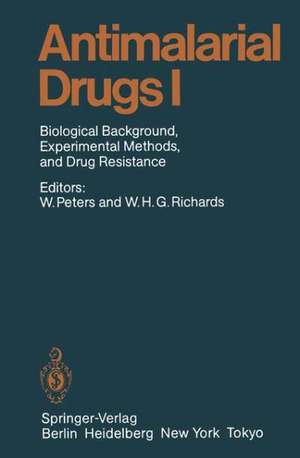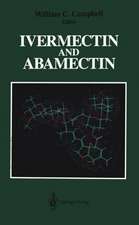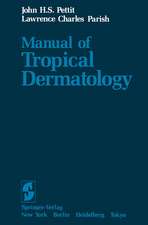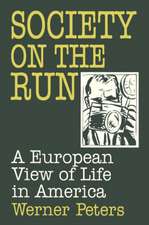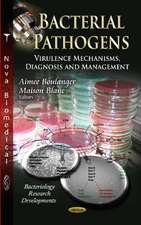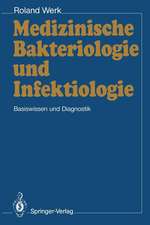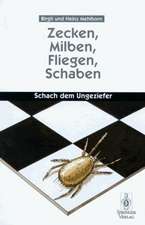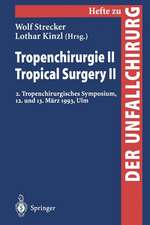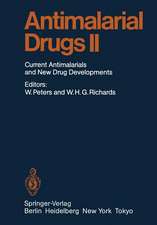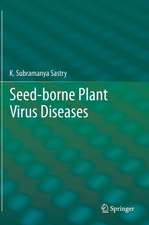Antimalarial Drugs I: Biological Background, Experimental Methods, and Drug Resistance: Handbook of Experimental Pharmacology, cartea 68 / 1
Contribuţii de A.L. Jr. Ager, V. Boonpucknavig, S.-C. Chou, K.A. Conklin, D.W. Jr. Davidson, R.E. Desjardins, M. Fernex, P.C.C. Garnham, H.M. Gilles, M.H. Heiffer, D.W. Jr. Korte, M.R. Levy, G.H. Mitchell, W. Peters, S. Punyagupta, W.H.G. Richards, K.H. Rieckmann, R.N. Rossan, I.W. Sherman, T. Srichaikul, G. A. T. Targett, D.C. Warhursten Limba Engleză Paperback – 19 noi 2011
Din seria Handbook of Experimental Pharmacology
- 5%
 Preț: 3517.78 lei
Preț: 3517.78 lei - 5%
 Preț: 1425.97 lei
Preț: 1425.97 lei - 5%
 Preț: 1435.28 lei
Preț: 1435.28 lei - 5%
 Preț: 1430.52 lei
Preț: 1430.52 lei - 5%
 Preț: 1930.69 lei
Preț: 1930.69 lei - 5%
 Preț: 1922.47 lei
Preț: 1922.47 lei - 5%
 Preț: 1937.46 lei
Preț: 1937.46 lei - 5%
 Preț: 2117.58 lei
Preț: 2117.58 lei - 5%
 Preț: 2119.96 lei
Preț: 2119.96 lei - 5%
 Preț: 2117.38 lei
Preț: 2117.38 lei - 5%
 Preț: 1088.17 lei
Preț: 1088.17 lei - 5%
 Preț: 1098.27 lei
Preț: 1098.27 lei - 5%
 Preț: 1420.29 lei
Preț: 1420.29 lei - 5%
 Preț: 1104.84 lei
Preț: 1104.84 lei - 5%
 Preț: 1104.84 lei
Preț: 1104.84 lei - 5%
 Preț: 1108.14 lei
Preț: 1108.14 lei - 5%
 Preț: 1106.69 lei
Preț: 1106.69 lei - 5%
 Preț: 1105.77 lei
Preț: 1105.77 lei - 5%
 Preț: 1174.35 lei
Preț: 1174.35 lei - 5%
 Preț: 1432.50 lei
Preț: 1432.50 lei - 5%
 Preț: 408.48 lei
Preț: 408.48 lei - 5%
 Preț: 409.63 lei
Preț: 409.63 lei - 5%
 Preț: 539.90 lei
Preț: 539.90 lei - 5%
 Preț: 720.47 lei
Preț: 720.47 lei - 5%
 Preț: 733.09 lei
Preț: 733.09 lei - 5%
 Preț: 731.27 lei
Preț: 731.27 lei - 5%
 Preț: 746.43 lei
Preț: 746.43 lei - 5%
 Preț: 747.72 lei
Preț: 747.72 lei - 5%
 Preț: 725.24 lei
Preț: 725.24 lei - 5%
 Preț: 742.80 lei
Preț: 742.80 lei - 5%
 Preț: 393.23 lei
Preț: 393.23 lei - 5%
 Preț: 735.66 lei
Preț: 735.66 lei - 5%
 Preț: 728.33 lei
Preț: 728.33 lei - 5%
 Preț: 389.52 lei
Preț: 389.52 lei - 5%
 Preț: 730.71 lei
Preț: 730.71 lei - 5%
 Preț: 740.58 lei
Preț: 740.58 lei - 5%
 Preț: 730.19 lei
Preț: 730.19 lei - 5%
 Preț: 723.42 lei
Preț: 723.42 lei - 5%
 Preț: 731.27 lei
Preț: 731.27 lei - 5%
 Preț: 726.68 lei
Preț: 726.68 lei - 5%
 Preț: 3516.49 lei
Preț: 3516.49 lei - 5%
 Preț: 729.26 lei
Preț: 729.26 lei - 5%
 Preț: 737.11 lei
Preț: 737.11 lei - 5%
 Preț: 730.92 lei
Preț: 730.92 lei - 5%
 Preț: 738.78 lei
Preț: 738.78 lei - 5%
 Preț: 909.94 lei
Preț: 909.94 lei - 5%
 Preț: 720.10 lei
Preț: 720.10 lei - 5%
 Preț: 734.74 lei
Preț: 734.74 lei - 5%
 Preț: 727.80 lei
Preț: 727.80 lei
Preț: 731.07 lei
Preț vechi: 769.55 lei
-5% Nou
Puncte Express: 1097
Preț estimativ în valută:
139.91€ • 145.53$ • 115.50£
139.91€ • 145.53$ • 115.50£
Carte tipărită la comandă
Livrare economică 14-28 aprilie
Preluare comenzi: 021 569.72.76
Specificații
ISBN-13: 9783642692536
ISBN-10: 3642692532
Pagini: 508
Ilustrații: XVIII, 484 p.
Dimensiuni: 170 x 242 x 27 mm
Greutate: 0.8 kg
Ediția:Softcover reprint of the original 1st ed. 1984
Editura: Springer Berlin, Heidelberg
Colecția Springer
Seria Handbook of Experimental Pharmacology
Locul publicării:Berlin, Heidelberg, Germany
ISBN-10: 3642692532
Pagini: 508
Ilustrații: XVIII, 484 p.
Dimensiuni: 170 x 242 x 27 mm
Greutate: 0.8 kg
Ediția:Softcover reprint of the original 1st ed. 1984
Editura: Springer Berlin, Heidelberg
Colecția Springer
Seria Handbook of Experimental Pharmacology
Locul publicării:Berlin, Heidelberg, Germany
Public țintă
ResearchCuprins
The Malaria Parasites.- 1 Life Cycles.- 2 Metabolism.- 3 In Vitro Culture Techniques.- Host Responses to Malaria.- 4 Immunity.- 5 Clinical Pathology.- Experimental Models.- 6 In Vitro Techniques for Antimalarial Development and Evaluation.- 7 Use of Avian Malarias (In Vivo).- Chapte 8 Rodent Malaria Models.- 9 Malaria Models in Simian Hosts.- 10 Surrogate Models for Antimalarials.- 11 Interactions Between Chemotherapy and Immunity.- Preclinical and Clinical Trial Techniques.- 12 Preclinical Testing.- 13 Clinical Trials — Phases I and.- 14 Clinical Trials — Phases III and IV and Field Trials.- 15 Pharmacogenetic Factors in Antimalarial Drug Testing.- Antimalarial Drug Resistance.- 16 History and Current Status of Drug Resistance.- 17 Evaluation of Drug Resistance in Man.- 18 Experimental Production of Drug Resistance.
